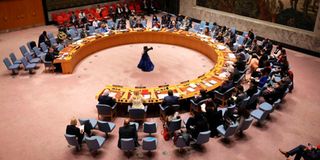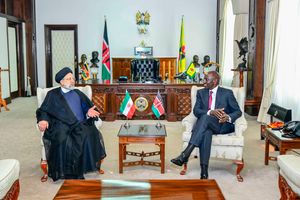A peek into legal disputes between countries and international law

Members of the UN Security Council meet to discuss the humanitarian crisis in Ukraine at the United Nations headquarters on March 07, 2022 in New York, New York.
What you need to know:
- As the battle raged, Ukraine opened a new war front of a legal nature.
- It filed a court case at the International Court of Justice (ICJ) in The Hague.
Many people know that there is a war between Ukraine and Russia. This is effectively a dispute between two countries being fought on battle fields. What may not be known is that this fight is also in court.
All of this started when Russia invaded Ukraine on February 24 this year. Russia argued that it had taken the action as a defensive measure to prevent genocide in eastern Ukraine being committed against Russian language speakers in that region.
As the battle raged, Ukraine opened a new war front of a legal nature. It filed a court case at the International Court of Justice (ICJ) in The Hague and sought orders for Russia to stop the military action within Ukraine. Ukraine’s ground for this court case was that the reason given by Russia for the invasion was untrue, as there was no genocide or threat of it in Ukraine at the time of the military action.
A second reason given by Ukraine was that Russia was wrong to take that action because even though both countries have signed and are bound by the Genocide Convention of 1948, the convention does not allow any party to invade another to prevent genocide.
Ukraine therefore sought what under Municipal law would be the equivalent of an interim injunction, that is, an order for a party to stop a given action until the case is heard and determined. Russia did not attend the hearing of the case but sent a document to the court stating its objections to the orders that Ukraine was seeking form the court.
On March 16, 2022, the International Court of Justice ruled on the request by Ukraine. Of the court’s 15 judges, 13 accepted Ukraine’s request and ordered that the Russian Federation should immediately suspend the military operation it had started in Ukraine. Interestingly, two judges of that court, a Russian and a Chinese, did not agree with the order of the majority for Russian to stop the invasion.
There was doubt as to whether Russia would comply with the order. This may explain the vulnerability of international courts, which have no compulsive authorities to enforce their orders.
This is just one of many cases where the International Court of Justice had to make decisions on disputes between countries in respect of invasion into each other’s territories or for unauthorised military presence of one country in its neighbour’s territory.
Right of access
In 1955, Portugal and India found themselves in a dispute before the ICJ over the right asserted by Portugal to Indian territory. Portugal filed the case and asked the court to declare that it had the right of access through Indian territory on its way to its own enclave territories around Goa, known as Dadra and Nagar Aveli.
These territories, though rightly belonging to Portugal, were adjacent to the Indian peninsular and therefore Portugal could only have land access to them by passing through Indian territory. Portugal therefore sought an order from the court that it had a right of passage through the Indian territory on its way to Dadra and Nagar Aveli and that India had a corresponding legal obligation to respect that right and grant unlimited access as and when required by Portugal.
The complaint was that India had declined to give that right of access and therefore affected Portugal’s right of sovereignty over the two enclaves. The court found that Portugal indeed had the right of access to the enclaves through Indian territory as claimed but that the right did not include the use of armed Forces through the strip of land that was Indian territory. This meant that India would be entitled to prevent Portugal from having its military forces use the passage to the enclaves.
In Africa, the case that comes to mind is that of the 1970 advisory decision of the ICJ regarding the continued presence of then Apartheid South Africa in South West Africa, as Namibia was then known.
Before the UN General Assembly made a resolution in 1966, then apartheid South Africa had a mandate to administer the South West Africa territory. In 1969, the Security Council directed South Africa to withdraw from Namibia.
Later, the refusal to leave the territory and the continued occupation was declared illegal. When South Africa refused to heed all these directives, the UN sought an advisory opinion from the ICJ on the legal consequences for UN member states on South Africa’s refusal to withdraw from Namibia.
The ICJ gave its advisory opinion to the effect that South Africa’s continued occupation of Namibia was illegal. The court also advised that all tier countries were obliged to ignore and treat all actions taken by South Africa in regard to Namibia as illegal and of no significance. By this, the court asserted that the occupation was illegal in international law and that it needed to be opposed by all countries, including those that were not members of the UN.
Armed aggression
But the latest case was that between the Democratic Republic of Congo and Uganda. In 1999, the DRC filed a case against Uganda in the ICJ. It claimed that the Ugandan military had committed acts of armed aggression by invading its territory, contrary to the charters of both the United Nations and the African Union. The DRC wanted Uganda to stop the aggression and to compensate it for the intentional destruction and looting of natural resources and property from within its territory by Ugandan soldiers.
In response to this, Uganda filed a counterclaim against the DRC for acts of aggression against Uganda as well and for attacks on Uganda’s diplomatic premises and citizens in DRC.
The judgment of the court was given in 2005 and found that the DRC had not consented to the presence of Uganda’s soldiers in its territory and rejected Uganda’s claim that the use of force was in self-defence.
It also found that there had been violations of international humanitarian law for which Uganda was liable. However, on the issue of exploitation of DRC’s natural resources, which the DRC had claimed, the court rejected this claim for lack of evidence.
Uganda’s counterclaim of mistreatment of its citizens at an airport in the DRC and attacks against its embassy were upheld as having been proven. The court held in so doing DRC had acted contrary to the Vienna Convention on diplomatic relations and the rules of international law on diplomatic relations.
The court then left it to the parties to negotiate compensation between themselves. The two countries were unable to reach an agreement on this and went back to court in 2021. In a judgment delivered in February 2022, the court spelt out specific financial amounts to be paid for the various categories of damage and loss. The compensation is to be paid in instalments with effect from September 1, 2022.
This line of cases shows that while invasion of or occupation of a neighbour’s territory in international law can lead to resistance on the battlefield, it can also be the subject of court battles and that sometimes the battles are even fought simultaneously.
The writer is Head of Legal at Nation Media Group PLC





